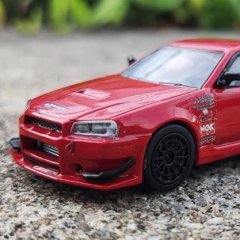Search the Community
Showing results for tags 'commercial vehicle'.
-
Opting for an EV for commercial use is not only environmentally friendly, but cost effective as well - start your journey with Hong Seh Evolution. It wasn't too long ago when Electric Vehicles (EV) were still fresh on the market - back then range wasn't confidence inspiring, charging facilities aren't as accessible and these cars really don't make much sense. These days, EV chargers can be found all over Singapore, in petrol kiosks, HDB carparks, shopping malls and offices. Most EVs will also do well over 200km in a single charge, and can be charged up pretty quickly with the appropriate chargers. What this means, is that EVs make a lot more sense and are much easier to live with, and as a result, business owners have much to gain from switching over to EVs for their fleets. Opting for an EV benefits more than just the environment EVs are known to be good for the environment as they do not have an internal combustion engine that emits noxious fumes through a tailpipe. But the benefits aren't simply limited to saving the earth - the same exhaust fumes are uncomfortable and unhealthy for humans as well. This is especially apparent when it comes to commercial vehicles, where you'll often leave the engine running as you load up cargoes to be more efficient on the go. With an EV, you won't have to worry about any harmful and unpleasant exhaust fumes. You can just leave the vehicle running with air-con on to keep the cabin cool, you can even take a short break in comfort in the carpark if you want. And they aren't only clean and green. Powered by electric motors, EVs are able to produce plenty of torque and will do so instantly - this is especially handy for the type of use that commercial vehicles sees. EVs will help your business to save on costs No matter what your company does, cost savings will surely be desirable, and EVs is one way to achieve it. Unlike cars powered by conventional engines, EVs have lesser wear and tear components - you don't have to worry about stuff like air filters, spark plugs or engine oil, and with regenerative braking, your brake pads will also last longer! This results in a simpler maintenance routine that will incur lower costs in the long run. However, the largest cost savings that EVs offer comes from the lower cost of charging when compared to the cost of petrol or diesel. Although EVs can cost a little more than its internal combustion engine counterparts, you will be able to recoup your investment the more you utilise an EV - perfect in commercial use where the car will see plenty of mileage. If you can install chargers in your own facility, you will be able to keep your EVs charged and ready at an even more cost-effective rate. In line with the government's direction to go green, the Commercial Vehicle Emissions Scheme (CVES) has been introduced recently to promote the adoption of eco-friendly commercial vehicles. As such, each vehicle that complies with the requirements of CVES band A will be entitled to an incentive of $15,000, further sweetening the switch to EVs for commercial use. Modernise your fleet with DFSK Don't wait! Start your cost-saving journey now by switching your fleet to the EVs now. Hong Seh Evolution Pte Ltd is committed to provide you with innovative EVs from DFSK to modernise your business for maximal cost savings and efficiency. With the DFSK EC35 van, EC31 lorry and EC31 refrigerated trucks, to choose from, you can be sure to find something that fits your company's needs. These EVs are all built with powerful electric motors and durable chassis to withstand the demanding conditions that commercial vehicles see on day-to-day basis. The EC31 lorry can be configured to suit different needs - the lorry bed can be boxed up, fitted with a tailgate, or with a canopy. If your business requires a van, there's the EC35, and for those in the cold-chain business, the EC31 refrigerated trucks will be just what you want. Go green with Hong Seh Evolution Hong Seh has been in the car industry for over 50 years, offering value-added services to support its customer base. Not only does it offer these highly dependable commercial electric vehicles from DFSK, but it does so at a reasonable price, along with high loan amounts available. Additionally, it also offers 24 hours breakdown service and has a team of IMI (institute of Motor Industry - UK) certified technicians to support your EV journey. Therefore it isn't surprising that Hong Seh has already sold over 400 units of electric commercial vehicles in 2022. If you are looking to make the switch to EV, look no further, Hong Seh is the choice. To find out more about the DFSK commercial EVs you can reach out to Hong Seh Evolution at 8030 8030, or visit its showroom at 237 Alexandra Road, The Alexcier #01-06 Singapore 159929. You can also visit DFSK Singapore's website for more information on the EVs.
-
- hongsehevolution
- electric
-
(and 2 more)
Tagged with:
-
Source: https://www.straitstimes.com/singapore/transport/lta-tweaks-calculation-of-commercial-vehicle-coe-quota-to-even-out-supply SINGAPORE - Buyers of commercial vehicles can expect less fluctuation in the supply of certificates of entitlement (COEs) for such vehicles, after the Land Transport Authority (LTA) revised the way it calculates the quota available for bidding. The LTA now takes the average number of commercial vehicle registrations under the Early Turnover Scheme (ETS) from the previous four quarters, or 12 months, to calculate the COE supply for each three-month quota period, starting with the current quota for May to July 2023. Previously, it used the number of ETS registrations from the previous three months. The LTA told The Straits Times that the change “provides more stability to our COE supply and reduces the likelihood of ETS numbers exceeding deregistrations in a single quarter”. There would have been zero commercial vehicle COEs available for tender from May to July 2023 if the LTA had not modified its method for calculating COE supply for this category. This is because the number of ETS registrations from January to March 2023 – used to calculate the COE supply for May to July – exceeded the number of scrapped commercial vehicles captured in the formula after taking away the contribution to Open category COE. The number of ETS registrations was unusually high in March 2023, with 1,482 such registrations out of 2,512 recorded in the first three months of this year. With the change, ETS registration figures will be recorded in the same way as vehicle deregistrations in the COE supply calculation. The LTA began using the average number of vehicles deregistered in the past four quarters to calculate COE supply starting with the quota for February to April 2023. The number of commercial vehicle COEs available for tender is driven primarily by two components: the number of vehicles that were scrapped, which forms the basis of the upcoming COE supply, and ETS registrations, which is deducted from the deregistration figure. Under the current policy, the supply of commercial vehicle COEs is allowed to grow by 0.25 per cent a year. This is set to remain until January 2025. Under the ETS, the owner of an older commercial vehicle can switch to a new one with cleaner emissions by paying a discounted rate of the COE price instead of having to bid for a new one. The exact amount payable depends on the existing vehicle model and the replacement model that will be registered under the scheme. The current iteration of ETS kicked in on April 1, 2023, and expires on March 31, 2025. In 2021 and 2022, ETS registrations outnumbered commercial vehicle registrations using new COEs. The trend continued in the first three months of 2023, where 2,512 ETS registrations represented 86.03 per cent of the 2,920 commercial vehicle registrations for the period. The dominance of the ETS route to register new commercial vehicles in the first quarter of 2023 may have been driven by the general shortage of commercial COEs available for tender when dealers were rushing to register vehicles before April 1, 2023. The date was when incentives under the Commercial Vehicle Emissions Scheme were halved for some vehicles from $30,000 to $15,000. The ETS benefit was also reduced. In the case of light commercial vehicles, retiring an old van with Euro III emission levels for a new, lower emission model such as a Suzuki Every after the switchover would see the ETS incentive reduced from 45 per cent to 20 per cent. A stricter emission test protocol also came into force. Mr Neo Tiam Ting, director of Think One, which deals in commercial vehicles, said there was a big rush in March for ETS-eligible vehicles that can be used to register new vans before April 1. This has since subsided. In the current three-month period till July, there is a monthly average of 137 commercial vehicle COEs available for tender. This was an increase of 59.3 per cent over the monthly average of 86 such COEs in the previous three months. The price of commercial vehicle COEs has risen significantly, hitting a record high of $91,101 in March 2023. It was $48,889 in March 2022. With the current elevated COE prices, the resale value of a used vehicle in the open market can be higher than the revised ETS incentive. This makes it difficult for motor traders to source ETS-eligible vehicles for buyers keen to grow their fleet. Between 2013 and 2022, ETS has accounted for 63,449 commercial vehicle registrations, compared with the 61,866 units that were put on the road with new COEs in the same period. In November 2022, the LTA and National Environment Agency announced that ETS for light commercial vehicles will end on March 31, 2025. The agencies said they would be looking at other means to encourage owners to switch out of older commercial vehicles and buses.
- 22 replies
-
- 4
-

-
.png)
-
- lta
- commercial vehicle
-
(and 1 more)
Tagged with:
-
Everything also can cheat. It is not only bad for our environment, but our health too. 😷 Source: https://www.straitstimes.com/singapore/transport/emission-cheating-devices-installed-in-some-trucks-and-buses-in-singapore SINGAPORE - Some diesel trucks and buses in Singapore have been fitted with devices that override the systems meant to clean up their exhaust emissions, The Straits Times has learnt. Popularly known as "defeat devices", they are sold online and allow vehicles to bypass emission standards and, in doing so, spew out high levels of nitrogen oxide - a poisonous greenhouse gas. Vehicle owners can save thousands of dollars each year by skimping on the exhaust treatment solution, known as AdBlue, which removes nitrogen oxide from diesel vehicle's exhaust emissions. At least one local workshop was found to offer an "AdBlue removal service", in addition to freelance mechanics who install such devices for a fee. In response to queries, the National Environment Agency (NEA) said it does not regulate the use of such cheat devices. But the agency, which sets vehicle emission standards here, added that it takes a serious view of devices that may bypass teh control of pollutant emissions. NEA also said it will work with inspection centres to monitor the use of such devices and enhance its regulations where necessary. It is not known how prevalent such devices are in Singapore. They are illegal in most European countries. Based on data from the Land Transport Authority, there are 172,996 diesel-powered vehicles as at Aug 31. The majority of those that are eight years old or newer would require AdBlue to operate properly. Diesel engine emissions include nitrogen oxide. When diesel vehicle is running, AdBlue, which is stored in a separate tank, is automatically injected into the exhaust system to convert the harmful fumes into nitrogen and water before the gases leave the vehicle's tailpipe. AdBlue is used in many diesel trucks and buses on Singapore roads. Globally, the exhaust treatment fluid is widely adopted by vehicle manufacturers to meet tightening emission standards. Keeping the vehicle topped up with AdBlue costs around 4 per cent to 5 per cent of the amount spent on diesel fuel. Commercial vehicles that clock high mileage will need to refill AdBlue more frequently. The solution is available at petrol stations as well as specialised AdBlue sellers. For private cars that do not cover so many kilometers, the top-up is usually done as part of the annual service at workshops. The price of Adblue is influenced by the rising cost of natural gas, a key ingredients used in its production. Currently, Adblue costs between $1.70 per litre to over $2 a litre, up 30 per cent from prices in 2021. In addition to saving on AdBlue refills, the cheat device enables the vehicle to be driven, even if the emission-control system is broken. Breakdowns can be caused by poor maintenance or by using lubricants that are meant for older diesel vehicles, which are cheaper to buy but are not suitable for these engines. Fixing such control systems is expensive. Mr Chew Guan Do, 62, who manages a fleet of trucks, said the bill easily exceeds $2,000 when control systems on the tipper trucks fail. Diesel vehicles also seem to need such repair more frequently as they age, adding downtime on top of hefty bills. There are different types of cheat devices - but their main function is to hookwink the vehicle's sensors to think there is AdBlue in the system when there is none. The simplest version of such devices, which are available online for as little as $40, plugs directly into a vehicle's diagnostic port. This type of devices, which takes the vehicle's emission-cleaning system out of play, can be removed before regular inspections. Experts said the vehicle will function normally and pass the tests, if it is otherwise roadworthy. A freelance engine-tuning expert, who spoke on the condition of anonymity, said he has programmed a truck's computer to bypass the emission control system and has not had any issues. Many of these hacks promise improved fuel efficiency and increase engine performance. With the added horsepower, the engine will produce even more poisonous exhaust gases.
-
That's a really long wall of text, so I'll sum it up for you. The owner of a 2011 Mercedes Viano was denied a HDB Multi-Storey Car Park season parking with the main reason being the excessive weight (more than 2,000kg) of the vehicle. So what does he do? He proceeded to spend some time checking out the various cars parked in HDB MSCP and came up with a short list of cars that weigh more than 2,000kg. If you look at this excerpt from HDB's website regarding the parking restrictions for commercial vehicles (the Mercedes Viano is predominantly used as commercial passenger buses), it is a straightforward rule that commercial vehicles parking in a sheltered car park must not exceed 2,000kg. With the rationale behind it being safety and environmental concerns as well as "efforts to preserve the character and ambience of residential estates"... Hmm, maybe HDB just find the Viano too ugly to be parked in a housing estate? In all seriousness though, this netizen has a point, this issue likely stemmed from outdated regulations. These regulations were probably established back when commercial vehicles weighing more than 2,000kg are agricultural behemoths. Maybe HDB should look into updating its regulations? in the meantime, I suppose this guy should get rid of the Viano and get something else, like one of the cars he mentioned instead?
- 11 comments
-
- 1
-

-
- season parking
- hdb carpark
- (and 4 more)
-
I happened to browse upon a link about LTA is calling a surprise industry-wide meeting with motor traders, sparking speculation that it will announce more changes to the COE system... http://www.sgcarmart.com/news/article.php?AID=9537 In view of the high cost of owning a private car, anyone has thought of buying a commercial car. What are the pros & cons? Any idea which make/model is suitable for ferrying passengers (7-8 seaters) as well as carrying goods?
-
Hi, Just to check, if there is any one here that drives a Peugeot Partner?? I'm driving a partner model 2015, and I do not have any good experience with them. anyone here has any good or bad experience to share? In a nutshell, got my ride in dec and it's been 7 times that i have been to the workshop to resolve the same issues. and yes, same issues dont get resolve. issues are not critical, but i wonder how many times do i have to visit them. the vehicle is good to drive but it seems that servicing is pale in comparison. original intention is to buy a 5008, but i think i should just keep my money till my view changes.
-
Intending to get a small commercial vehicle for my courier business Can anyone driving a toyota liteace share with me what is the fuel consumption? Is this the best economical van? was intending to get a smaller capacity van but seems like no other good choice
- 12 replies
-
- toyota
- commercial vehicle
- (and 5 more)
-
I would like to highlight my case. Last Saturday, I went to Khatib Central to pick up my wife after she has completed her CNY shopping. My brother borrowed my car so I had to drive my L200. It had a height of 1.95m (after installation of airport light beacons for use in within Changi Airport), i was not able to enter the MSCP located at Blk 848A as it had a height limit of 1.8m. To make matters worse, there were no space to park at the roadside or the loading & unloading lots as the road itself was congested. Thus I did not have a choice but to park at the Season Parking Lot located at Level 1 as its height limit is 2.15m. I came back to my vehicle with my wife to realise that I have received a fine and when i got home i proceed to file an appeal. I am ok to have my appeal rejected but the grounds that it had been rejected is rather lacking in common sense. It was due to the fact that there is people complaining. If it was like you are a repeat offender or your vehicle is below 1.8m you can definitely park at the MSCP, i still can accept it. I can't park anywhere else and I cant possibly ram through the height limit gantry and damage HDB's property. From now on, I will go on foot to Khatib Central but I hope that public servants can solve problems like renovating the carpark to solve the parking problem and not resort to summons. A smart society solves the problem at the root not at the ends. I have since paid my fine
- 48 replies
-
- 3
-

-

-
- parking
- commercial vehicle
- (and 4 more)
-
Volkswagen has released the Edition 30 Caddy, the brand's light commercial vehicle, to commemorate its 30th year in production this year. The external changes of the Caddy Edition 30 include gloss black roof, fog lights, roof rails, twin halogen headlights, painted bumpers and 17-inch Budapest alloy wheels with black highlights. 'Edition 30' logo can be found on the dual sliding doors, rear end and door sills. On the inside, the special edition receives two-tone Alcantara upholstery, a leather steering wheel and climate control. Other goodies include an upgraded RCD 310 radio/CD unit, electrically adjustable and heated door mirrors. The compact van is powered by a 2.0-litre turbo diesel engine which is capable of 138bhp. The manual version completes the century sprint in 10 seconds while the six-speed DSG model takes just 0.1 seconds longer. The DSG-equipped Caddy returns a combined fuel consumption of 6.5 litres per 100km.
-
- modifications
- discussions
- (and 8 more)
-
Earlier this year in January, MINI announced its plans to revive the MINI Van and showcased the vehicle at the Geneva Motor Show. The car will be based on the MINI Clubman and the company called it the MINI Cargo. At that time, there were no photos or rendered images on how the car would look like. Just before the above mentioned auto show began, MINI showed images of the car and they also changed the name to the MINI Clubvan. Initially, the company stated that the MINI Clubvan will only be a concept and they have no immediate plans to put the vehicle into production. It is during auto exhibitions where many automakers gauge public reaction to a certain new offering before deciding whether it will go into production. In this case, MINI used the recent Geneva Motor Show to see how popular their MINI Clubvan was. And it appears that the public fully approves it and MINI will enter the Clubvan into production. The MINI Clubvan is hugely based on the Clubman
-
- new model
- other news
- (and 13 more)








